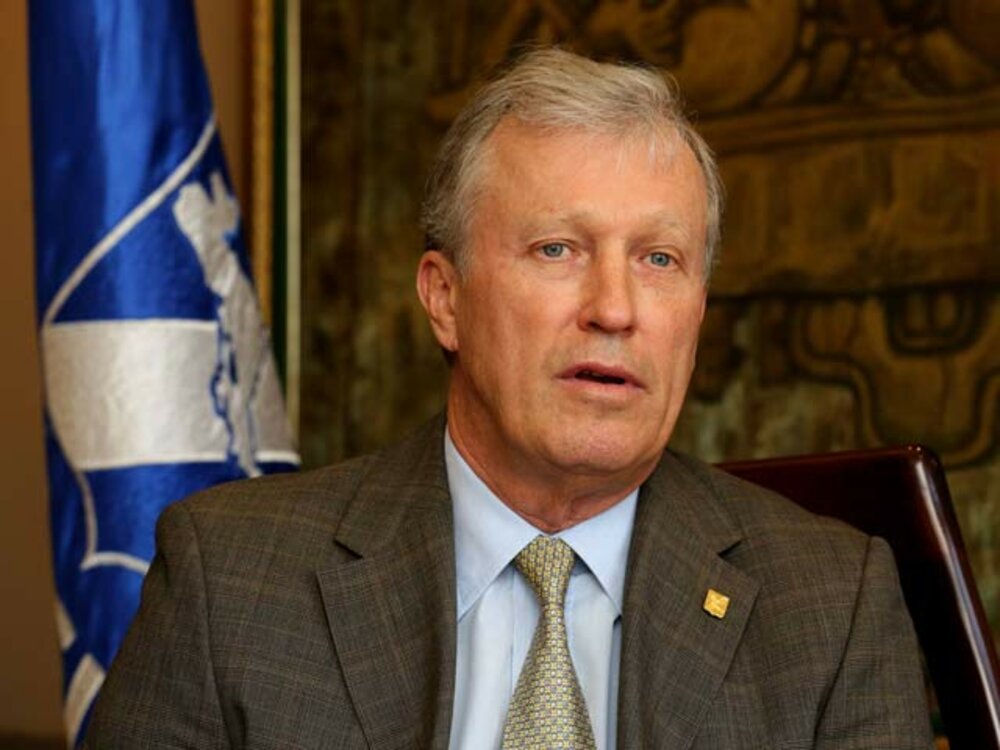Dr. Nick Rischbieth retires from the CABEI Executive Presidency after 23 years of service to Central America

He sowed the seeds of true regional sustainable development.
His work has been noteworthy for its prudence and technical audacity.
Tegucigalpa, November 30, 2018 (AFP SERVICES/CABEI). This month, Dr. Nick Rischbieth Glöe concluded his ten-year tenure as Executive President of the Central American Bank for Economic Integration (CABEI) with the satisfaction of having done an impeccable, streamlined and integrally technical job, sowing the seeds of true development in the region.
For approximately 23 years he has worked tirelessly at the service of the multilateral institution, where he stood out as a constant promoter of initiatives, which were focused on generating high social and economic impact with the goal of transforming Central America into a better place for its inhabitants to live.
Dr. Rischbieth career at CABEI started as Treasurer in 1995, where he contributed to the opening the Bank's doors to international markets. In 2003 he was promoted to Financial Manager and in 2007 was elected Executive Vice President. He assumed the Executive Presidency in 2008 by means of an international public tender, which applied highly specialized criteria in order to choose the position of highest ranking official at CABEI. Dr. Rischbieth was selected for the position during the 2008-2013 period and was then re-elected for the 2013-2018 period.
CABEI came out with flyinh colors in the "lost decade”
"Our two-decade mandate took place in times of uncertainty and chaos known as the lost decade, and we came out with flying colors," he stressed. He was referring to the grave conflicts that afflicted Central America between 1980 and 1990. In this regard, he recalled that "there was so much concern at that time that even the founding member countries thought of closing CABEI, although it did not occur."
With Dr. Rischbieth at the helm, the Bank successfully overcame other challenges such as the 2008 bursting of the real estate bubble and subsequent subprime US mortgage crisis, which led to a world-wide stock market crash. In addition, he successfully navigated other pitfalls such as 2009 political upheaval in Honduras. However, CABEI came out stronger upholding its mission and bravely and decisively challenging its present and its future.
Central American “Jaguars”
Dr. Rischbieth successfully implemented innovative business models to strengthen the Bank's equity in a framework of operational excellence aimed at the sustainable economic and social development of the Central American countries.
During his administration he changed CABEI dynamics and made the multilateral organization transcend with the incorporation of Panama, the Dominican Republic and Belize as non-founding regional members. In his efforts to integrate Central America with the Caribbean, Cuba was incorporated as a non-regional member and it is expected that the Republic of Korea, which is considered to be the eighth economic power in the world, will join as the newest CABEI non-regional member. Dr. Richbieth stated that, "We must take advantage of the presence of Asian tigers in order to become Central American jaguars."
Envisioning a United Central America
Dr. Rischbieth stated that, "It is time to talk about the important significance of a united Central America instead of a divided one. If more countries join CABEI, it will expand its borders becoming bigger and stronger for the benefit of the region’s 41,000 million inhabitants. This is my dream."
He argued that CABEI has a greater presence in Central America than any other similar institutions operating on the continent: "We grant more credits because we provide agile and timely responses to the countries of the region, which proudly consider CABEI as their Bank."
CABEI is among one of the 10 most important development institutions in the world, distinguishing itself as a relevant issuer in capital markets with permanent access to financing under competitive conditions.
Credit Rating
The main international credit rating agencies, including Standard & Poor's and Moody's and Fitch, recognize the importance of the Bank as a provider of long-term resources backed by its solid financial position, preferred creditor status and continuous support to its member countries. Its ratings on the "A +" scale with a positive outlook have established CABEI as an institution of high financial strength.
Dr. Rischbieth: “I still have much more to give.”
After working intensely for Central America, Dr. Rischbieth plans to take a break in his career at CABEI; an institution he truly cherishes. When asked, he admitted that prestigious organizations and entities have shown interest in appointing him as a financial adviser: "I am still analyzing these offers, but have not yet decided, however, I know that professionally I still have much more to give to Central America and will continue to do so.”
Born in Tegucigalpa to German parents, he has studied in Honduras, the United States and Europe. He earned his BA in Economics from Rice University and a Master of Business Administration from Washington University in St. Louis, Missouri. He obtained a Ph. D in Finance at the Institute of Money and Capital Markets at the University of Hamburg, Germany.








